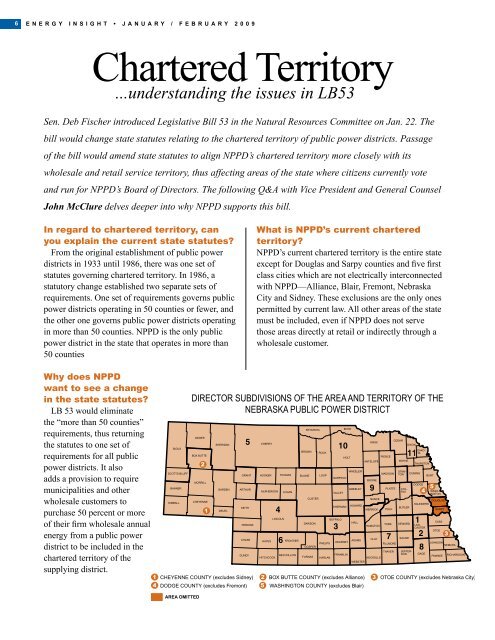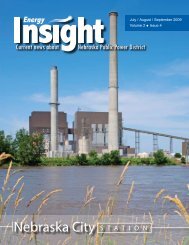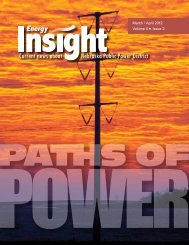January / February 2009 - Nebraska Public Power District
January / February 2009 - Nebraska Public Power District
January / February 2009 - Nebraska Public Power District
You also want an ePaper? Increase the reach of your titles
YUMPU automatically turns print PDFs into web optimized ePapers that Google loves.
6 ENERGY INSIGHT • jaNuaRY / fEbRuaRY <strong>2009</strong><br />
ENERGY INSIGHT • jaNuaRY / fEbRuaRY <strong>2009</strong> 7<br />
Chartered Territory<br />
...understanding the issues in LB53<br />
Sen. Deb Fischer introduced Legislative Bill 53 in the Natural Resources Committee on Jan. 22. The<br />
bill would change state statutes relating to the chartered territory of public power districts. Passage<br />
of the bill would amend state statutes to align NPPD’s chartered territory more closely with its<br />
wholesale and retail service territory, thus affecting areas of the state where citizens currently vote<br />
and run for NPPD’s Board of Directors. The following Q&A with Vice President and General Counsel<br />
John McClure delves deeper into why NPPD supports this bill.<br />
In regard to chartered territory, can<br />
you explain the current state statutes?<br />
From the original establishment of public power<br />
districts in 1933 until 1986, there was one set of<br />
statutes governing chartered territory. In 1986, a<br />
statutory change established two separate sets of<br />
requirements. One set of requirements governs public<br />
power districts operating in 50 counties or fewer, and<br />
the other one governs public power districts operating<br />
in more than 50 counties. NPPD is the only public<br />
power district in the state that operates in more than<br />
50 counties<br />
Why does NPPD<br />
want to see a change<br />
in the state statutes?<br />
LB 53 would eliminate<br />
the “more than 50 counties”<br />
requirements, thus returning<br />
the statutes to one set of<br />
requirements for all public<br />
power districts. It also<br />
adds a provision to require<br />
municipalities and other<br />
wholesale customers to<br />
purchase 50 percent or more<br />
of their firm wholesale annual<br />
energy from a public power<br />
district to be included in the<br />
chartered territory of the<br />
supplying district.<br />
What is NPPD’s current chartered<br />
territory?<br />
NPPD’s current chartered territory is the entire state<br />
except for Douglas and Sarpy counties and five first<br />
class cities which are not electrically interconnected<br />
with NPPD—Alliance, Blair, Fremont, <strong>Nebraska</strong><br />
City and Sidney. These exclusions are the only ones<br />
permitted by current law. All other areas of the state<br />
must be included, even if NPPD does not serve<br />
those areas directly at retail or indirectly through a<br />
wholesale customer.<br />
DIRECTOR SUBDIVISIONS OF THE AREA AND TERRITORY OF THE<br />
NEBRASKA PUBLIC POWER DISTRICT<br />
How would amending the state statutes<br />
affect NPPD’s Board of Directors?<br />
Currently, NPPD’s chartered territory includes some<br />
areas where the citizens do not receive their electricity<br />
either directly or indirectly from NPPD; however, the<br />
people in these areas still have the authority to vote<br />
and run for NPPD’s Board of Directors. NPPD is<br />
governed today by an 11-member, popularly elected<br />
Board of Directors. Each Director is elected from one<br />
of 11 subdivisions of the chartered territory which<br />
include one or more counties. The population of those<br />
subdivisions—based on the U.S. Census which is<br />
conducted every 10 years—must be approximately the<br />
same.<br />
The issue before us is that customers who rely<br />
exclusively on NPPD for power supply are at risk<br />
of seeing their voices diluted by citizens who have<br />
limited or no direct financial stake in the outcome<br />
of NPPD’s actions. After the 2010 U.S. Census is<br />
released, areas that have limited or no long-term<br />
power supply contracts with NPPD—such as Lincoln,<br />
Grand Island and Hastings—could have an increased<br />
voice in NPPD governance simply because of the shift<br />
in population to larger communities.<br />
As drafted, LB53 would result in the elimination of<br />
the chartered territory where three directors currently<br />
reside (two directors in Lincoln and one in Broken<br />
Bow), thus eliminating their positions on NPPD’s<br />
Board.<br />
Now that the bill has been introduced<br />
and advanced by the Natural Resources<br />
Committee, what happens next?<br />
The bill went to General File, which is the first<br />
time the full Legislature has the opportunity to<br />
debate and vote on bills. On Monday, Feb. 9, LB 53<br />
was advanced from General File to Select File by a<br />
vote of 36-2. Select File is the second debating and<br />
voting stage. This step allows another opportunity<br />
for amendment. Bills on Select File may be killed<br />
or advanced to the next stage, Final Reading. The<br />
<strong>Nebraska</strong> Constitution requires that before final<br />
passage, all bills must be read aloud in their entirety<br />
by the Clerk of the Legislature, unless three-fifths (30<br />
members) of the Legislature vote not to do so. After<br />
the bill is passed on Final Reading, the Governor has<br />
five days to decide to either approve or veto the bill.<br />
The Legislature can override the bill, but it takes the<br />
vote of 30 senators.<br />
RESOLuTION<br />
Of NEbRaSKa PubLIC POWER DISTRICT<br />
No. 08-151<br />
adopted: December 12, 2008<br />
WHEREAS, it is the mission of <strong>Nebraska</strong> <strong>Public</strong> <strong>Power</strong> <strong>District</strong> (NPPD) to safely<br />
generate and deliver low-cost, reliable energy and provide outstanding customer<br />
service; and<br />
WHEREAS, NPPD generally supports legislation that sustains <strong>Nebraska</strong>’s public<br />
power system and protects the interests of electric consumers in <strong>Nebraska</strong>, and<br />
WHEREAS, NPPD generally opposes legislation and regulation that impose broadbased<br />
mandates that do not account for local conditions, experience, evidence, and<br />
performance.<br />
NOW, THEREFORE, BE IT RESOLVED with reference to the <strong>2009</strong> sessions of the<br />
<strong>Nebraska</strong> Legislature and the 111th U.S. Congress and related regulatory actions,<br />
that the <strong>District</strong>:<br />
1.<br />
Opposes legislation which would jeopardize public power.<br />
2. Supports water-related legislation and regulation designed to protect both<br />
groundwater and surface water needs of the <strong>District</strong>, and will consider the<br />
surface water and groundwater needs of its customers as it formulates<br />
positions.<br />
3. Supports legislation which provides increased funding for Renewable Energy<br />
Production Incentives (REPI), or for other state and federal incentives<br />
comparable to those afforded investor-owned utilities and other private entities<br />
for renewable energy projects.<br />
4. Opposes legislation mandating a renewable portfolio standard without<br />
guaranteed adequate incentives to carry out the mandate in a cost-effective<br />
manner.<br />
5. Opposes the sale of federally-owned and operated generation and<br />
transmission facilities.<br />
6. Supports continued sale of Western Area <strong>Power</strong> Administration power at costof-service<br />
prices.<br />
7. Supports federal legislative and regulatory actions which advance the<br />
development of a high-level nuclear waste management/disposal facility.<br />
8. Supports economy-wide solutions to address greenhouse gases based on<br />
proven science, which for the electric industry, focuses on early commercially<br />
viable technology development, expansion of energy efficiency and renewable<br />
technologies, and a diverse generating mix to reduce CO2 emissions.<br />
9. Opposes expanding the applicability of taxes/fees on public power districts.<br />
10. Supports state environmental legislation and regulation that is equivalent to<br />
federal requirements unless it can be demonstrated that federal regulations do<br />
not adequately protect public health and the environment.<br />
11. Supports a modification of the public power district procurement statutes to<br />
increase the sealed bid threshold from $100,000 to $500,000 for public power<br />
districts with annual revenues in excess of $500,000,000.<br />
12. Supports legislation which reduces statutory barriers to receive <strong>Power</strong> Review<br />
Board approval for renewable energy projects.<br />
13. Supports legislation which requires that wholesale customers of a public power<br />
district receive at least 50 percent of their annual power and energy under a<br />
firm power contract in order to be included within the chartered territory of the<br />
supplying district.<br />
14. Supports legislation allowing officer salaries to be approved by the board with<br />
a majority vote.<br />
* An original motion was made to approve the <strong>2009</strong> Legislative Policy Resolution, to<br />
include Item Nos. 1-12, and Item No. 14; this motion carried by a vote of 11-0.<br />
A second motion was made for the approval of the <strong>2009</strong> Legislative Policy<br />
Resolution, Item No. 13, which passed by a vote of 8-3, and 1 abstention.









